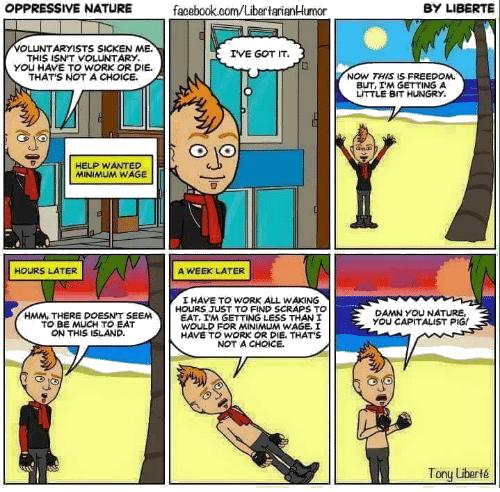ALL human life, without exception, requires effort (i.e. labor) to sustain. If a human being is alive, someone is laboring (or has labored) to sustain that life. Even under the most fortunate circumstances, basic necessities such as food, water, and shelter must be procured which requires the expenditure of at least some effort on someone’s part.
The real distinction is between those who sustain their own existence and those whose existence is sustained by the labor of others. The latter category can be subdivided into those whose lives are sustained through the voluntary labor of others (i.e. charity) and those whose lives are sustained through coercion, force, violence, and theft.
Thanks to specialization, it is not necessary for every individual to be competent in all the various types of labor necessary to sustain life. Individuals may choose to specialize and trade some portion of their particular labor for other types of labor performed by others. In this way, someone with a talent for whittling or web design can obtain food even if they lack the talent or inclination to grow it themselves.
Thanks to the existence of property ownership and money (a store of value), it is not necessary for every individual to labor daily or even for the entirety of their lives. The value of their labor can be stored and saved for future consumption. In this way, property ownership serves to allow for the easy storage and transfer of one’s labor.
Thanks to the existence of inheritance, it is possible for individuals to transfer some portion of their life’s labor to their spouse, children, or others whose existence they wish to make easier and more fulfilling. Much as ownership and money allow saving for one’s own consumption, so—through inheritance—do they allow that prudently stored labor to be transferred to future generations.
Voluntary transfers of labor aren’t limited to inheritance, though. Charity is one of the vehicles whereby individuals can transfer their labor (either in its raw or stored form) to others. Whether it’s a parent caring for a young child, a child caring for an elderly parent, or a benevolent stranger buying a homeless man lunch, the voluntary transfer of labor can aid in the sustaining of life in cases where people can’t or won’t perform the necessary labor themselves.
Modern man is incredibly fortunate that specialization, property ownership, money, inheritance, and charity have made the labor necessary to sustain life much less grueling and pervasive, but many people still aren’t satisfied. Instead of laboring to obtain the goods and services they wish to consume, they use coercion, force, violence, and theft to steal the labor of others.
While such practices are widely condemned when they involve chattel slavery or burglary, they are broadly embraced and even celebrated when given the façade of legitimacy and called taxation and welfare. It is, however, a distinction without a difference.
Just as most people would agree that there is no moral distinction between murdering someone with your own hands and hiring a hitman to do so on your behalf, so there is no moral distinction between robbing your neighbor directly by breaking into his house and outsourcing your theft to the state and its agents. While forcing a man to serve you through threats and violence is generally recognized as slavery, it is often overlooked that refusing to pay an agreed-upon bill for services rendered is a morally equivalent theft of labor.
If you are reading this, you are alive and the sustainment of your life requires labor. I wonder though, exactly whose labor is sustaining your life. Is it your labor or are you stealing some of mine? If it is the latter, I wonder if you would be so inclined to steal my labor if you had to do so directly instead of allowing a proxy to do so on your behalf.
To many people, statism has made theft appear kosher and has created the illusion that stealing can be justified, but I suspect that misapprehension would fade if the recipients of the stolen loot were required to obtain it through their own efforts… But then again, that’s exactly what these passive plunderers are trying to avoid, isn’t it?






